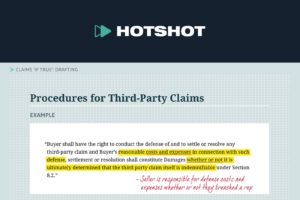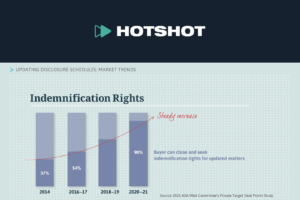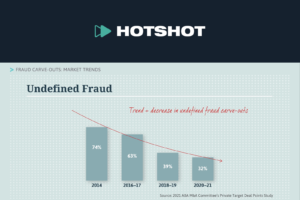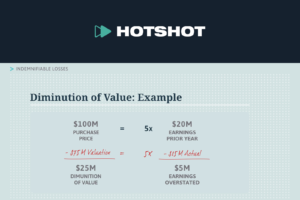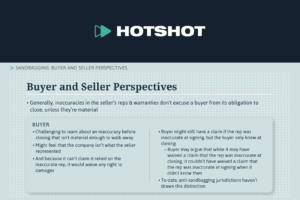This is a summary of the Hotshot course “No-Shops: Changing Board Recommendations and Matching Rights,” a look at when a target board can change its recommendation for a superior proposal or an intervening event that also includes a discussion of matching rights. View the course here.
No-Shops: Board Recommendations and Matching Rights
- Public M&A agreements require that the target’s board recommend that its shareholders vote in favor of the deal.
- The board’s fiduciary duties also require that it maintain the ability to change its recommendation until the shareholders approve the transaction.
- That’s why the deal-protection framework contains fiduciary-out exceptions. Under these exceptions:
- The target board can change its recommendation; and
- Terminate the existing deal to take a topping bid any time before the shareholders approve the existing deal.
Change in Board Recommendation
- Usually, for the target board to change its recommendation, it must:
- Determine, in good faith, after consulting with its outside legal and financial advisors, that continuing to recommend the transaction would be inconsistent with its fiduciary duties.
- Most deals also require that the board conclude that the new deal is a Superior Proposal (and not one that could or would be).
- The reason for this higher standard is that, at this stage:
- The new bidder should have had an opportunity to review the diligence, negotiate with the target, and make a binding bid.
- This lets the target board make a more definitive assessment than during the earlier stages of the deal.
- The reason for this higher standard is that, at this stage:
- The typical Superior Proposal formulation requires that the new proposal be:
- For a minimum amount of the target’s stock or assets (usually at least 50%);
- More favorable to the target’s stockholders from a financial point of view than the existing deal (when taking into account all relevant considerations, including timing, regulatory conditions, and deal certainty); and
- Occasionally, there is an absolute, rather than a comparative, requirement.
- For example, that the new deal be reasonably likely to be completed or that it has financing (if it’s a cash deal).
Matching Rights
- Before a board can change its recommendation for a Superior Proposal, the initial buyer generally has 3 to 5 business days after the board’s determination to match the new terms.
- If the competing bidder amends its proposal, the initial buyer has subsequent, shorter match periods. In other words:
- Before a target board can take action that might destroy the original deal, it agrees to give the original bidder a chance to propose a revised (and better) deal; and
- The Superior Proposal determination must include any such revised terms.
- If the competing bidder amends its proposal, the initial buyer has subsequent, shorter match periods. In other words:
Intervening Events
- In some deals, the parties also set out the target’s right to change the board recommendation based on an Intervening Event.
- Intervening Event is often defined as something significant that occurs after the signing of the deal that wasn’t known or, sometimes, also wasn’t reasonably foreseeable, at the time of signing.
- The idea is that a target board can change its recommendation but shouldn’t be able to simply change its mind about what it already knew at signing.
- A common example is “discovering gold under the target’s headquarters.”
- It’s more likely that some other positive development for the target makes the original deal no longer justifiable—such as FDA approval for a biotech company.
- Intervening Event is often defined as something significant that occurs after the signing of the deal that wasn’t known or, sometimes, also wasn’t reasonably foreseeable, at the time of signing.
- The parties will also often negotiate exceptions to the definition of Intervening Event.
- These exceptions clarify instances when the target board does not have the right to change its recommendations. For example:
- They might exclude adverse developments at the buyer in a stock-for- stock deal.
- The theory is that other provisions protect the target for those events, like the “no Material Adverse Effect” condition.
- They might exclude adverse developments at the buyer in a stock-for- stock deal.
- These exceptions clarify instances when the target board does not have the right to change its recommendations. For example:
This course also includes interview footage with Jenny Hochenberg from Freshfields Bruckhaus Deringer and Igor Kirman from Wachtell, Lipton, Rosen & Katz.



